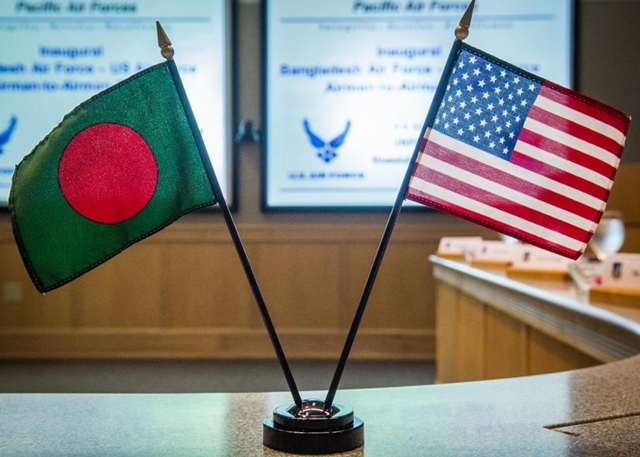Diplomatic correspondent
Published:2020-10-11 13:08:49 BdST
Indo-Pacific Strategy: US keen to get Bangladesh onboard
The United States seems to be keen more than ever before to have Bangladesh in its flagship Indo-Pacific Strategy (IPS) concept.
The US administration’s recent moves to deploy senior officials to persuade Bangladesh reflects the keenness of Washington. In interaction with Bangladesh in recent times, the US hardly missed a chance to raise the issue and describe the benefits of being engaged with the strategy.
Among many Washington moves, three very recent events are worth mentioning.
On September 11, US Secretary of Defence, Dr Mark T Esper, made a telephone call to Prime Minister Sheikh Hasina who is also in charge of the country’s Defence Ministry.
"The two leaders discussed their shared commitment to a free and open Indo-Pacific that ensures the sovereignty of all nations, and specific bilateral defense priorities, including maritime and regional security, global peacekeeping, and initiatives to modernize Bangladesh’s military capabilities," said a US Defence Department statement on the conversation. "Both leaders expressed their commitment to continue building closer bilateral defense relations in support of shared values and interests."
Three days later on September 15, the US Department of State organized a virtual briefing with Deputy Assistant Secretary of State Laura Stone, Bureau of South and Central Asian Affairs, and JoAnne Wagner, deputy chief of mission at the US Embassy in Dhaka.
The IPS is a vision in which all nations are independent, strong, and prosperous, according to Stone. The vision prioritizes support for principles that lead to peace and prosperity, sovereignty, secure communications networks, freedom of navigation and overflight, standards of trade and investment, free flow of data across international borders, respect for human rights and rule of law, and transparency of military activities.
“And if I want to leave you with one key message today, it’s that our efforts in the Indo-Pacific are rooted in developing sustainable, creative solutions that maximize the enormous potential of this region. And I think this is particularly true of Bangladesh,” she said. “Bangladesh is a relationship with enormous potential and a country with enormous potential, and we really do hope to grow on that. So the administration is looking to grow our relationship with Bangladesh as a key Indo-Pacific partner.”
Its strategic location, a huge population and thus a huge market, and manufacturing capabilities, are some of the qualities that make Bangladesh important for the US’ flagship strategy, the briefing was told. The participating officials, of course, denied the popular perception that the IPS is nothing but a move to contain the growing influence of China in the region.
On Friday, it was announced that Deputy Secretary of State Stephen Biegun, second senior most diplomat after Michael Pompeo, would visit Bangladesh from October 14-16.
“The Deputy Secretary’s engagements in Bangladesh will focus on advancing our common vision of a free, open, inclusive, peaceful, and secure Indo-Pacific region with shared prosperity for all, US-Bangladesh cooperation on Covid-19 response and recovery efforts, and sustainable economic development,” according to the State Department.
The dispatching of such a senior diplomat reflects the importance of Bangladesh with respect to IPS.
Unauthorized use or reproduction of The Finance Today content for commercial purposes is strictly prohibited.


